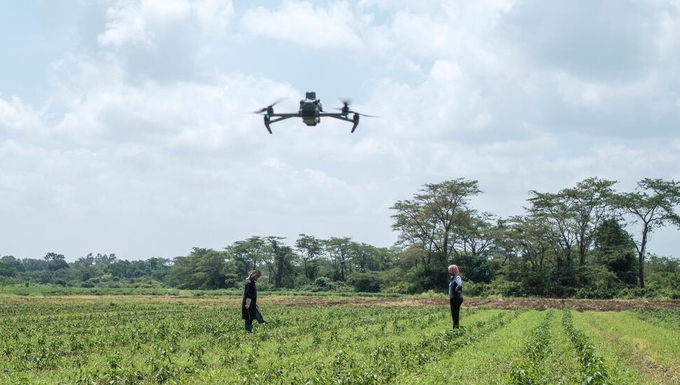May 22, 2025 | 04:24 GMT +7
May 22, 2025 | 04:24 GMT +7
Hotline: 0913.378.918
May 22, 2025 | 04:24 GMT +7
Hotline: 0913.378.918

A drone flies over a farm in Tanzania.
Artificial Intelligence and the ongoing digital revolution will inevitably transform the world and its agrifood systems, making it all the more urgent that the transformations they drive benefit everyone and contribute to solving global challenges, the Director-General of the Food and Agriculture Organization (FAO), QU Dongyu, said Friday at the Business Federations of the G7 (B7) meeting in Rome.
Artificial Intelligence is not just a technological shift but is driving a fundamental economic and social transformation at the broadest level, Qu said, noting that FAO recognizes its power to bring potential benefits to a wide range of populations and to contribute to improved efficiency and sustainability.
He noted that ”Digital agriculture can revolutionize how we produce, distribute and consume food,” he said, highlighting that potential benefits for farmers and stakeholders across agrifood systems include improved pricing data, minimizing food loss and waste, enhancing food safety and stimulating adoption of better seeds, fertilizer and sustainable practices.
The event took place at the Rome headquarters of Italy’s main business association, Confindustria. The B7 comprises the main business and industrial federations of the G7 members and the European Union. Once a year, the B7 presents its recommendations on selected priority topics to the G7 presidency, which this year is held by Italy.
The event was also attended by Italy’s deputy Prime Minister, Antonio Tajani, and a wide array of chief executive officers from international private companies.The FAO Director-General spoke at a session focused on charting new courses for cross-border global cooperation, joined by Mathias Cormann, Secretary-General of the Organization for Economic Cooperation and Development (OECD).
To broaden the positive impact of such enabling innovations, FAO is working closely with all partners, including governments, academia, the private sector, civil society and international organizations, advocating for a robust approach with targeted, coherent and comprehensive strategies and actions implemented in synergy and in compliance with ethical principles.
Data, energy, climate
The Director-General emphasized the central role that data plays in AI and digital technologies, noting that quality data is needed to train innovative tools and to accelerate actions such as agrifood systems transformation.
FAO has a formidable database in FAOSTAT, data is central to FAO’s Strategic Framework 2022-2031 and has an innovation lab to experiment with new sources and methods. One takeaway from those initiatives is that data ecosystems require significant investment and effective collaboration.
FAO stands ready to engage and partner with the B7 group and the private sector in this area, Qu said.Another absolutely critical area for collaboration and harmonization of approaches is in the energy sector. Decarbonization by 2050 is “simply not possible” without addressing energy consumption across agrifood systems, the Director-General said.
Qu also urged private-sector actors to increase their ambition for climate action and to show more accountability towards their supply chains and the communities in the countries from which they source, buy and sell their products.
(FAO)

(VAN) Attempts to bring down the price of the Japanese staple have had little effect amid a cost-of-living crisis.

(VAN) Fourth most important food crop in peril as Latin America and Caribbean suffer from slow-onset climate disaster.

(VAN) Shifting market dynamics and the noise around new legislation has propelled Trouw Nutrition’s research around early life nutrition in poultry. Today, it continues to be a key area of research.

(VAN) India is concerned about its food security and the livelihoods of its farmers if more US food imports are allowed.

(VAN) FAO's Director-General emphasises the need to work together to transform agrifood systems.

(VAN) Europe is facing its worst outbreak of foot-and-mouth since the start of the century.

(VAN) The central authorities, in early April, released a 10-year plan for rural vitalization.